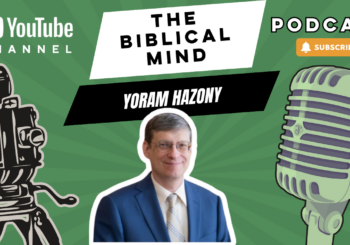Part of the Purifying Ourselves: Moral Formation in the Bible series
But Was Abraham Good? Ethical Complexity and Moral Reasoning in Genesis
We may take for granted that characters in the Book of Genesis, as in many stories, each manifest certain desires, choose courses of action, consider obligation and consequence, and at times even think “on the page” about what to do or what’s been done. Though Genesis famously concerns itself with God’s plan for the world and a certain people, it also evinces these characters’ moral dynamics.
Enjoying this article? Read more from The Biblical Mind.
But these dynamics are the very subject of moral psychology, a field that explores how humans operate and develop ethically, accounting for character, virtue, reasoning, emotions, intuitions, and values, among other things.
These disclosures give insight into how the Genesis characters—Abraham and Sarah, Isaac and Rebekah—reason through life’s obstacles and, in some ways, God’s plan. They calculate, judge, and decide, revealing how they operate—which also prompts the question of how they should operate. Moral psychology entails ethical evaluation, which is not straightforward in Genesis. Nonetheless, there are several possible ways to understand how the narrative of Genesis might be evaluating characters’ moral reasoning.
In what follows, I consider moments in Genesis 12–36 when the narrator describes the thoughts of certain characters at relative length, disclosing how they think “on the page,” so to speak. I then lay out the possibilities for how we, as readers, might ethically evaluate these characters’ reasoning and behavior.
Moral Reasoning in Genesis
We can assume that some level of mental activity is at work in every human action described in Genesis. However, “human reason” entails more than that: a certain deliberate thought process whereby humans, to some degree, think through a potential action or even a sequence of past events. Several scenes disclose characters’ thoughts and seem to raise questions about their use of reason.
On the back of God’s promises to Abram for land and children (Gen 12:1–9), Abram travels to Egypt because of a local famine and concocts a plan for survival. He instructs his wife, Sarai, to tell the Egyptians that she is his sister (12:10–13), motivated by his fear that Pharaoh will otherwise kill him.
Abram does indeed survive, but his plan has an apparently unforeseen consequence: the Lord afflicts the pharaonic household, so that Pharaoh sends Abram and Sarai out of Egypt (12:17-20). Despite this consequence, Abram’s reasoning is, interestingly, somewhat accurate; Sarai is received favorably and Abram himself survives. However, YHWH’s response and the ultimate outcome suggest, on the one hand, that Abram’s plan was misguided, though that is not entirely clear. On the other hand, and with more certainty, the episode indicates that YHWH will proceed with his own plan despite the questionable reasoning of his people.
The next several chapters of Genesis contain other instances of tension between human and divine plans. Abram questions God’s promise of a son and reasons that another member of his household will become his heir. In this case, though, the doubt is short-lived because God’s response bolsters Abram’s belief (15:1–6). However, Sarai also reasons aloud about her inability to have children, devising her own plan to ensure the fulfillment of God’s promise (16:1–2). She plans to use alternative means, namely, by having Abram conceive with her servant Hagar. But, again, though the plan proceeds with some accuracy—i.e., Abram and Hagar do indeed make a child—the fallout seems less expected. Sarai disdains Hagar and dismisses the child, causing her pregnant servant to flee into the wilderness. But God yet again salvages the situation that humans created, preserving Ishmael and his mother (16:7–16), and thereby giving Abram a son.
Years later, God appears to Abram, now Abraham, and reiterates the promises of the covenant. To this, Abraham responds in disbelief, in effect, “Shall a couple conceive at 100 years old?” (17:17). This response seems exceedingly reasonable given what Abraham knows about human beings, and Sarah herself later responds similarly (18:9–14), and it leads him, again, to concoct an alternative plan. He offers Ishmael to God as the son of choice (17:18). But, as might even be expected at this point, the Lord accommodates the human alternative, this time most explicitly: “As for Ishmael, I have heard you; behold, I have blessed him and will make him fruitful” (17:20 ESV).
By the time we reach the famous Genesis 22, these preceding scenes culminate in an opportunity for Abraham to either scheme or submit to God’s instructed plan. YHWH has demanded that Abraham offer up his son Isaac as a sacrifice, and rather than retorting, attempting to persuade, or pressing on with a reasoned alternative, Abraham simply says, The Lord will provide” (22:8). It seems that, here, human reason adheres to divine command.
The trend of questionable uses of human reason in the Abrahamic narratives, often attempting to fulfill YHWH’s promises in a way slightly off-track and even at odds with what God has said, leads, in several instances, to the Lord accommodating that human alternative. It would be too simple, perhaps incorrect, to generalize that human reason works in opposition to God’s command, for commandments are not really the feature. It is rather God’s promises that humans expect to see fulfilled and seem to attempt to realize by means of their own judgment, based on a certain view of how the world works, which is sometimes at odds with God’s more explicit instruction. Just as clearly, though, YHWH integrates these schemes into his very promises, bringing them to partial fulfillment despite, even through, human reason.
Though the stories of Abraham and Sarah illustrate human reason in operation, the ambitions of thought continue throughout the narratives of Genesis. Abraham lies again about his wife (ch. 20), and Isaac uses almost identical reasoning (26:6–11); Rebekah (Gen 27) devises an intricate plot to secure the blessing of her younger son, Jacob; Jacob fears Esau and produces a strategy for the safest reception of his brother (Gen 32–33); and Tamar tricks Judah into having sex with her (Gen 38). These are all instances of reasoning on display, giving readers insight into factors guiding these characters’ actions and decision-making.
Moral Evaluation and Ambiguity in Biblical Narrative
One of the greatest obstacles to interpreting the moral psychology of the characters in biblical narrative is the simple question of evaluation: What is approved of and disapproved of in the narrative? The reader of Genesis will be familiar with comments like “the Lord saw that the wickedness of man was great on the earth” (6:5) and that the sin of Sodom and Gomorrah was “very grave” (18:20), or that “Er, Judah’s firstborn, was wicked in the sight of the Lord” (38:7), and Joseph’s conclusion that “you meant evil against me but God meant it for good” (50:20).
Such explicit ethical evaluation, however, does not always occur, especially within Genesis 12–50. This absence has led some interpreters to read these narratives, and others like them, such as 1–2 Samuel, as stories without moral evaluation altogether, stories that invite moral reflection rather than moral conclusions. Consider the comments of Eryl Davies:
Biblical morality must allow for a diversity of interpretations and we must not settle for a single, unified reading that produces a bland, one-dimensional ethic. The task of the exegete is to demonstrate that a story can generate a whole repertoire of meanings and a rich montage of different perspectives, and to show that a single narrative may be subject to a wide range of interpretations.1Eryl W. Davies, Narrative Ethics in the Hebrew Bible: Moral Dilemmas in the Story of King David, LHBOTS 715 (London: Bloomsbury T&T Clark, 2022), 14.
Biblical narratives, in other words, contain a collection of moralities rather than a definite ethical profile.
However, other interpreters, though perhaps not “one-dimensional” in their readings, find more clear-cut ethical judgments, and these come in several forms. One is evidence of behavioral patterns, the ways that characters behave over the course of the narrative and the apparent consistency in this behavior. It garners most attention in the form of virtues, that is, the ideals aspired to in these stories. Gordon Wenham, for example, has identified piety, courage, generosity, and loyalty among the characters of Genesis, which he argues receive approval as virtues through repeated exercise, in positive contexts, and often with affirmation from other portions of the Hebrew Bible.2Gordon J. Wenham, Story as Torah: Reading Old Testament Narrative Ethically (Grand Rapids: Baker Academic, 2000), 88–89.
But Wenham’s model is more complex than patterns of behavior. He argues that biblical law lays an ethical baseline for evaluating the narrative, while God’s promises, as set out in Genesis 1–11 especially, form a teleological structure to which characters can contribute. We have, then, an evaluative troupe consisting of laws, ideals, and ends.3Which of course bears a strong resemblance to the three classic normative ethical theories: deontology, virtue, and consequentialism. In between the open-endedness of Davies and sophistication of Wenham are other interpretations of narrative biblical ethics, most of which are beset by a relative simplicity, a vow to combat legal reductionism, and an earnest hope to read biblical narrative as ethical literature.
In view of these options, then, what can we say of the moral reasoning outlined above? Though I have already hinted at the possible disapproval of human reason in Genesis, more can be said. A simplistic understanding of Abram’s scheme in Gen 12:10–20, for instance, would focus on his lie to the Egyptians: “Say you are my sister” (v. 13). Given the fact that one of the Ten Commandments forbids false testimony (Exod 20:16), Abram’s lie is wrong and therefore his plan is wrong. But perhaps Abram lies to preserve his own life because he has received promises from God that a great nation will come from his very own seed. Abram, then, is simply doing his part: preserving his life, and giving his family the best chance to survive and produce children, all because of God’s promise. Dishonest and fearful as he may be, Abram is also calculating, even creative. In any case, God intervenes to resolve the situation: “But the Lord afflicted Pharaoh and his house with great plagues because of Sarai, Abram’s wife” (12:17). This propels Abram and his family back towards the land of promise, continuing the fulfillment of the divine plan.
Genesis 12:10–20 is a good example of moral ambiguity in narrative analysis. It seems that one’s evaluation of Abram here depends on what criteria one brings to the story: biblical law (don’t lie), fulfillment of God’s promises (living, multiplying, and getting to the land), and human ingenuity (the success of one’s plan) have all been discussed, with somewhat varied results. Were we to consider other, perhaps clearer, portions of Genesis (i.e., chs. 1–11), then it appears that humans have a track record of getting things wrong thanks to their blatant refusal to cooperate with God’s commands and plans. Adam and Eve disobey God’s voice, Cain kills his brother, humans violate their boundaries (6:1–5), and they hoard together rather than filling the earth (11:1–9). Genesis 1–11 is full of moral evaluation from God himself, and it primes readers to expect the worst from humans. From that perspective, then, I think we can rightly question the “ingenuity” of human schemes in Genesis 12–50.
Along with reading Genesis 12–36 through the lens of 1–11, we might also read the stories of 12–36 through the lens of later events therein. Sarai’s plan with Hagar and birth of Ishmael seem discordant with the later conception of Isaac. The seeming impossibility, and at least uncertainty, of sacrificial provision on Mount Moriah for Abraham and Isaac suggests that plans made in view of unknown circumstances should proceed with a trust in the most basic promises of God, as available. Thus, Sarai’s plan to find an alternative womb for conception in view of her doubts and lack of knowledge about her own ability (ch. 16), or Jacob’s meticulous plot to avoid casualties in view of his uncertainty about Esau’s attitude (ch. 32), most likely bear some disapproval. That leads to the final ethical observation about these narratives: that everything therein is subsumed within the promises and plans of YHWH. That human reason is often wrong, usually questionable, sometimes right, and yet always redeemable from a broader theological standpoint.
End Notes
1. Eryl W. Davies, Narrative Ethics in the Hebrew Bible: Moral Dilemmas in the Story of King David, LHBOTS 715 (London: Bloomsbury T&T Clark, 2022), 14.
2. Gordon J. Wenham, Story as Torah: Reading Old Testament Narrative Ethically (Grand Rapids: Baker Academic, 2000), 88–89.
3. Which of course bears a strong resemblance to the three classic normative ethical theories: deontology, virtue, and consequentialism.
Image created by Rubner Durais
Did you enjoy this article? Check out The Biblical Mind podcast.





